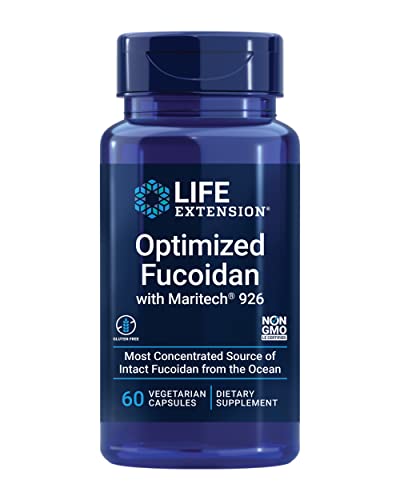Fucoidan for Asthma: Does It Help?
Quick Summary: A small study looked at whether a supplement called oligo-fucoidan could help people with asthma. The results showed it might lower inflammation, but it didn't significantly improve lung function or asthma symptoms.
What The Research Found
Researchers found that people with asthma taking oligo-fucoidan had lower levels of white blood cells (a sign of inflammation) and creatinine (a marker of kidney function). However, the study didn't show clear improvements in how well their lungs worked or how often they had asthma symptoms.
Study Details
- Who was studied: 20 adults with asthma.
- How long: The study lasted for 24 weeks (about 6 months).
- What they took: Half the group took oligo-fucoidan along with their regular asthma medicine. The other half took a placebo (a "dummy" pill) and their regular asthma medicine. The exact dose of oligo-fucoidan wasn't specified.
What This Means For You
This study is a starting point, but it's not enough to say if fucoidan is helpful for asthma. While it might help with inflammation, it didn't improve lung function or asthma symptoms. Talk to your doctor before adding any new supplements to your asthma treatment plan.
Study Limitations
- Small study: Only 20 people were involved, so the results might not apply to everyone.
- Missing Information: The study didn't specify the dosage of fucoidan used.
- Focus on Inflammation: The study primarily looked at inflammation markers, not the core asthma symptoms like breathing problems.
- Incomplete Data: The study did not provide complete data on lung function.
Technical Analysis Details
Key Findings
The study demonstrated that oligo-fucoidan supplementation significantly reduced white blood cell (WBC) count (p=0.038) and serum creatinine levels (p=0.012 at week 12; p=0.008 at week 24) compared to placebo in asthma patients receiving standard care. No significant improvements in pulmonary function (FEV data incomplete in provided summary) or Asthma Control Questionnaire scores were explicitly reported in the available excerpt. The primary conclusion centered on oligo-fucoidan's potential to modulate immune/inflammatory markers, specifically reducing WBC counts, but did not establish efficacy for core asthma outcomes like lung function or symptom control based on the provided results.
Study Design
This was a randomized, double-blind, placebo-controlled clinical trial conducted over 24 weeks. The study enrolled 20 patients with asthma, randomly assigned to either the fucoidan group (n=10) or control group (n=10). The control group received standard asthma treatment plus placebo, while the fucoidan group received standard asthma treatment plus oligo-fucoidan. Assessments included pulmonary function tests (PFTs), Asthma Control Questionnaire (ACQ) surveys, biochemical markers, inflammatory factors, and immune cell subtypes. Specific patient demographics (age, sex, asthma severity) were not detailed in the provided summary.
Dosage & Administration
The provided study summary does not specify the dosage, formulation, or administration frequency of the oligo-fucoidan supplement used in the intervention group. This critical detail is absent from the excerpt given for analysis.
Results & Efficacy
The only statistically significant results reported in the provided summary were:
1. WBC Count: Significantly decreased in the fucoidan group compared to placebo (p=0.038).
2. Serum Creatinine: Significantly decreased in the fucoidan group at both week 12 (p=0.012) and week 24 (p=0.008) compared to placebo.
No quantitative results, effect sizes, or statistical significance for pulmonary function (FEV data truncated), ACQ scores, specific inflammatory cytokines (beyond WBC), or immune cell subtypes were provided in the given excerpt. The reduction in creatinine, a kidney function marker not typically central to asthma pathophysiology, is noted but its clinical relevance to asthma management is unclear.
Limitations
Major limitations include the very small sample size (n=20 total), increasing risk of Type II errors and limiting generalizability. The absence of reported dosage information prevents replication or clinical application. The focus on WBC (a non-specific inflammation marker) and creatinine (not a standard asthma biomarker) instead of core asthma metrics like FEV1, FeNO, or eosinophil counts weakens the relevance to asthma control. The incomplete reporting of pulmonary function results (FEV data cut off) in the provided summary hinders assessment of the primary clinical outcome. Lack of demographic details and potential for unmeasured confounders further constrain interpretation.
Clinical Relevance
Based solely on the results provided in this excerpt, oligo-fucoidan cannot be recommended as an adjunct therapy for improving asthma control or lung function. The observed reductions in WBC and creatinine lack clear clinical significance for asthma management; lowered creatinine may even reflect altered kidney handling rather than a therapeutic benefit. The study provides preliminary in vivo evidence supporting oligo-fucoidan's potential immunomodulatory effects (via WBC reduction), but the small size, missing dosage data, and lack of impact on standard asthma outcomes mean these findings are insufficient to guide patient care. Larger trials focusing on established asthma endpoints (FEV1, exacerbation rate, symptom scores) with defined dosing are essential before any clinical relevance can be established.
Original Study Reference
Effects of oligo-fucoidan on the immune response, inflammatory status and pulmonary function in patients with asthma: a randomized, double-blind, placebo-controlled trial.
Source: PubMed
Published: 2022
📄 Read Full Study (PMID: 36307493)




